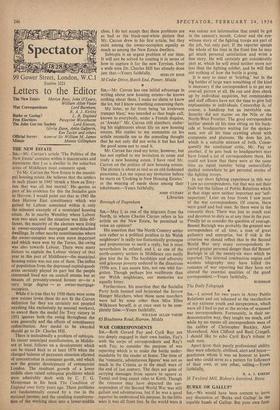WAR CORRESPONDENTS SIR,—Both Gerard Fay and Cyril Ray are too
deeply engaged in their own battles, Fay's with the corps of correspondents and Ray's with Fay, to consider the purpose of war reporting which is to make the battle under- standable by the reader at home, The time of the 'romantic, adventurous figures' was not so much in the Crimea as in the small wars of the end of last century. The days are gone of carrying messages from square to square at Tamai and long camel rides to Korti. Though the romance may have departed the cor- respondent of the Second World War was still gallant and adventurous, but if he was a good reporter he understood his purpose. In the little wars it was all front line. In the world wars it was colour not information that could be got in the cannon's mouth. Colour and the eye- witness story of the fighting troops are part of the job, but only part. If the reporter spends the whole of his time in the front line he may get much personal satisfaction and write a fine story. He will certainly get considerably shot at, which he will mind neither more nor less than the fighting soldier, and he will find out nothing of how the battle is going.
It is easy to sneer at 'briefing,' but in the big battles of large wars something of the kind is necessary if the correspondent is to get any over-all picture at all. He can and does check up by individual enquiries, but commanders and staff officers have not the time to give full explanations to individuals. Censorship is, of course, a handicap but an inevitable one. Security did not matter on the Nile or the North-West Frontier. The good correspondent neither spends all his time sitting on his back- side at headquarters waiting for the spokes- man, nor all his time crawling about with companies and platoons. He does his job, which is a suitable mixture of both. Conse- quently the combatant critic, Mr. Fay or another, if he gets back to headquarters may have found a lot of correspondents there. He could not know that there were at the same time an equal number being unmercifully shelled somewhere to get personal stories of the fighting troops.
In my short fighting experience in this war I saw no correspondents, but that was not their fault but the failure of Public Relations which at that stage were neither important nor 'self- important.' Later on four fronts I saw most of the war correspondents. Of course, there were good and had ones. So there were in the romantic days. There was just as much' zeal and devotion to duty as at any time in the past. Finally let us consider the question of courage. Bennet Burleigh was probably the greatest war correspondent of all time, a man of great gallantry and enterprise, but if risk is the criterion we should reflect that in the Second World War very many correspondents in- curred greater personal danger than did Bennet Burleigh in all the twenty-six wars which he reported. The internal combustion engine and wireless telegraphy may have killed the romance of war reporting but they have not altered the essential qualities of the good correspondent.—Yours faithfully,


































 Previous page
Previous page